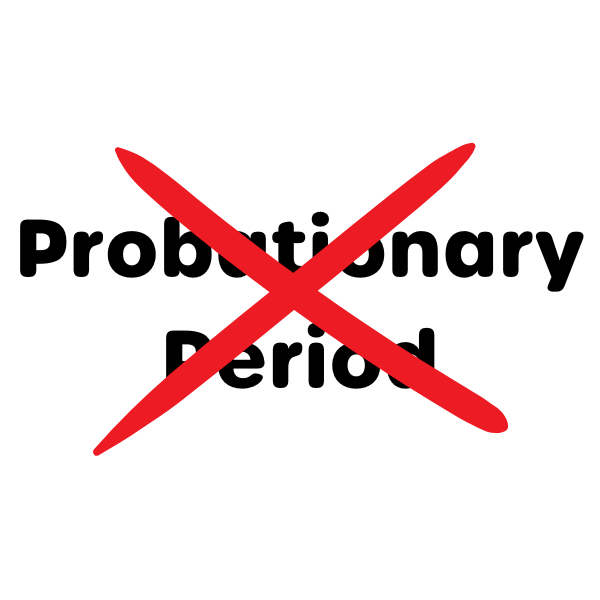Probationary Period
Should we Change the Name?

There are some ‘people processes’, for want of a better description, that seem to have stayed the same for a long time and probationary period is one of those.
What is a Probationary Period for?
For the Employer:
1. After the level of training, coaching and support I intend to provide, will the new employee be able to perform the role they have been employed to do, to the level I would expect?
2. Are they a good cultural and team fit?
3. Do I have any behavioural concerns?
For the New Employee:
1. Am I confident that, once I have received the level of training, coaching and support the company promised during selection, I will be able to perform the role to the level required?
2. Will I enjoy and get satisfaction from the role?
3. Does the culture of the company sit comfortably with my own personal values?
4. Do I fully understand the rules and guidelines of what is expected, so I know I can adhere and commit to them?
5. Does the environment match my social needs. Are there sufficient work events and socialising for me? Conversely, will I feel forced into attending work events or ‘out of work’ socialising?
6. Is the company interested in my development and will they be an advocate for my personal growth?
7. What scope for promotion is there, or a sideways move to something completely different?
8. Will I get the work-life balance I need here?
9. Is this a nice place to work and do they genuinely care about my wellbeing?
It feels like the new employee has just as much, if not more, to work out during a probationary period than the employer.

The reason for questioning the name probationary period is because there are 2 definitions.
The first one is relating to the release of an offender from detention, subject to a period of good behaviour under supervision.
Well, I would like to think that isn’t a reflection of the workplace!
The second definition is more appropriate; relating to a process of testing or observing the character or abilities of a person who is new to a role or job.
The name probationary period is biased towards a company assessing a person’s ability to perform a role; this doesn’t sound like the 2-way process we claim a probationary period to be.
Generally, employees are put through a process during their probationary period and informed at the end whether they have passed or not!
Businesses do not proactively put themselves through a similar process in the same way and don’t seek approval from a new employee as to whether they have passed or not. And, in reality, do companies really make it their mission to help a new employee see their probation as a 2-way process?
In my experience, someone who starts a new job does so with the hope and intention that it works out. They may have spent quite some time looking for the right role, gone through an application process followed by a selection process before finding out they have been successful. They may have had to serve notice on another company to be able to accept the role.
All of these things are time consuming and nerve wracking. Changing jobs is up there with one of the most stressful things you can do. These are all reasons why someone would really hope their new role works out and they pass their probation.
Equally, from a business perspective, recruitment does not happen quickly, easily or cheaply. One of the biggest challenges facing businesses today is attracting new talent, so a recruitment process needs to be robust, flexible and attractive. It can require a team of people to put a selection process together, execute it, score and then make decisions. Whether this is done in-house or out sourced, a company’s recruitment bill is rarely small.
Given how much energy both parties have already put into this new role, it is in everyone’s interest that any new employee successfully navigates their way through any probationary period.
But what’s in a name, after all it is the effectiveness of how something is done that counts, not what it is called right?
Having said that, giving the probationary period a more appropriate name sends out a clear message to any new employee and this could really make a difference to how someone feels approaching their new job and their confidence level during that first period of time.
What does a Probationary Period look like?
I know what a traditional probationary period looks like.
An employer will spend quality time with a new employee giving them their ‘induction’ training; they will go through all the housekeeping aspects – Health & Safety, working hours, sort out any technology needed for the role, car parking, identification badges, structure of the organisation, values, and culture.
An induction will also incorporate their job training, which will differ greatly depending on the role, but may include systems training, policies and procedures or any required admin/reporting.
A new starter is likely to meet their peers, their team, their direct line Manager and their direct line Manager’s Manager. They may also meet, and spend time with, other areas of the business such as HR, sales, marketing, finance, operations, facilities and IT.
Over time they will be given tasks to do on their own or with guidance or might be assigned a buddy, they will start to get a real understanding of what the job entails and what is expected of them within that role. This will include targets and objectives that can be measured and reviewed.
I would say these are pretty much standard parts of a probationary period. This is all good stuff but very one sided. This satisfies what an employer needs to get from a new employee’s probation but not so much the other way around.

Reviewing a Probationary Period
A probationary period is a period of review, and this tends to consist of ‘formal’ review time and ‘less formal’ catch up time.
Time spent generally talking or catching up with a new employee is less formal whereas specific time set aside to review progress is normally a more formal process.
Timings for formal reviews
How often a new employee has a formal sit-down review, which is documented and signed for, varies across organisations.
As a general rule of thumb:
– Reviews should be carried out regularly whether performance is on track or not.
– An employee should always know when their next review is so they know whether something can be left until that point or raised sooner.
– At the end of each review, the new employee needs to leave the meeting with clarity on whether they are on track or not. If they are not, what specifically do they need to do.
– There should never be any surprises in a review.
– All areas of performance should be reviewed, not just where the new starter has not hit the required level yet.
We would always recommend a full sit-down review at least every 4 weeks, starting from week three, until the probationary period is complete.
A 3-month probation: Reviews at the end of week 3, 7 and 11. Probation finishes end of week 12.
A 6-month probation: Reviews at the end of week 3, 7, 11, 15, 19 and 23. Probation finishes end of week 24.
Starting at week 3 means you will always complete the final review one week before the actual probation is due to finish; this gives a week to formalise everything and means that whatever happens at the end of a probationary period will never be a surprise to a new employee.
That covers what probationary period means, what it is for, what tends to happen during one and how they are reviewed.

How Does Calling it a Different Name Change Anything?
What’s in a Name and does it really matter what it is called? To answer that, we probably need to look at what a possible new name might be.
Here are two suggestions I would make to change the name of the probationary period to.
Suggestion One – Collaboration Period
The definition of collaboration is ‘the action of working with someone to produce something’.
‘Working with someone’ says right from the outset that this involves two parties, both equally invested in producing something.
This sends out such a different message.
Suggestion Two – Alliance Period
There are three definitions of an alliance. ‘A union or association formed for mutual benefit.’ ‘A relationship based on similarity of interests, nature or qualities.’ ‘The state of being joined or associated.’
I don’t know about you but all 3 of those definitions are a better reflection on a 2-way process by a country mile!
How things would be different?
The fundamentals we have looked at don’t change – that period of time is still for the same reasons; a new employee still needs their induction training and you will still need to carry out reviews with the same timings.
However, with a different way of thinking comes a different approach. This is now a collaboration or an alliance, which immediately suggests that the things that need to be achieved and the responsibility of those, sits with two parties, not one – in this case, the Employer and the Employee.
Every activity can be changed to a different approach. Let’s take a few and look at how we can carry out the same activity with a different approach, to get a better result.
The induction:

If we take the housekeeping we listed, which is crucial for someone’s safety and wellbeing – Health & Safety, working hours, technology, car parking, ID badges, structure, values, and culture.
Areas like these are traditionally a tick box exercise. To support this, there can often be a form literally with boxes on it that get ticked as things get explained. The new employee is normally asked to sign the form as the company’s evidence. Or, they can be modules completed online which also serve as evidence that someone has read and understood the information.
With a collaboration or alliance, we should be getting to the end of each day and asking ourselves if we have learnt and understood information about our new starter in equal measure to the amount of information we have imparted to them.
This way, it won’t feel like a tick box exercise, it will feel like the company is genuinely wanting to help them fit into their new role comfortably and with an understanding of their own personal needs.
Some simple changes in the way these are communicated could make a difference. For example, rather than start with what the company values are, ask the new employee what is important to them – at home as well as at work, and then make a link between that and the company values and culture.
Instead of explaining where the car park is and where they can/can’t park, ask them how they have been finding their journey to work, what time are they having to set off from home, how long is their overall journey taking them. Then let them know where they can park.
Ask their understanding of what their working hours are to establish how well this has been explained during the recruitment process and start to see how these fits with their work-life balance, capture any concerns early.
You can still have a paper / electronic trail as evidence, which is signed by both parties, not just the employee.
The big difference is you are demonstrating collaboration and alliance with your new employee.
I know some companies give a new starter a timetable and it shows how their first couple of weeks will go and will include dates and times to meet other people around the business. Sometimes people are left to navigate their own way to these meetings.
This is fine, it’s a great test of their ability to get to a certain point at a certain time. It would be so much more collaborative if someone was allocated to go with them to these introductions. It is an opportunity for a nice start for both parties and shows you care more about the quality of the meeting than their ability to get to that certain point at that certain time.
Collecting someone when they have finished is a perfect opportunity to find out how it went, what they learnt, how they see where that person/department fits with their role. You can also assess if the pace of the timetable suits the new starter – are they showing indications that things are moving too slowly so you can pick up the pace. Or are they getting information overload, which will enable you to push back other meetings and do something lighter with them.
All of these conversations are less formal reviews, capturing information to help you understand the needs of the employee and how they are on track to complete their collaboration or alliance period.
How would the reviews be different?
Stick to the recommended timings for reviews – a formal review every 4 weeks starting at week three.
The approach can be quite different. Most companies have some sort of probationary review form for the employee, which may or may not be filled in prior to the review but is worked through assessing the employee’s performance in the relevant areas and setting objectives at the end based on how that goes.
A new collaboration or alliance review should include two parts to truly demonstrate a 2-way process – you need to review the employee’s performance but also the employer’s performance.
This is a great opportunity for you to find out how you are doing against the promises you made during the selection process. Listing those things out and allowing a new employee to score against them is incredibly powerful and speaks volumes about how comfortable you are to invite and accept feedback.
Whether there are two forms, one form with two parts, or just one form to incorporate both is up for debate but the concept is about taking equal responsibility for that review.
Three tangible examples:
Working Hours

Working hours is something that would have been discussed as part of the recruitment process.
Working hours could be on the review form with a question like, “the hours we explained you would be working, are these the hours you have been asked to work and how are they fitting with your work-life balance, travel time and wellbeing?”
This answer will tell you whether you are explaining the right hours to a new starter and/or whether the departments actual requirements are the same in practice as theory. You are also showing you care that those agreed hours are working for the new person.
Values

Companies often refer to values and culture during selection. I have given an example of a ‘Caring’ value below which you could adapt to any of your company values.
With Values on the review form, you could ask, “we describe one of our values as “Caring” what evidence have you seen of this, and have we given you any examples of this?
This is a great chance to have a conversation around what ‘caring’ looks like to that individual, giving you the opportunity to demonstrate it going forward.
Induction training

Companies make a number of promises around what support new starters will get when they join, so you can tailor the question.
As an example, “we told you that you would get all the training and support you need during your induction training” let’s talk through what you have had so far, where there are any gaps and capture how we can improve that for you next week.
We all know that when you are close to something, you stop seeing it with clarity. Every time a business has a new starter, they have a fresh pair of eyes seeing things you won’t. This is an ideal way of capturing what they see, how they would change it and sharing ideas on how it could be improved.
Take every aspect that you detail or offer during the whole selection process, lay it out on a form with some really good, probing questions to have a wholesome 2-way conversation and capture how you are doing against them.
Reviewing Employee Performance
Some questions to ensure you cover during your reviews.
– Tell me about your role and how you are settling into it.
– How have the last 3 weeks been for you?
– Tell me, specifically, what you have covered in the last 3 weeks.
– These are the targets / objectives we agreed you should be able to meet by week 3, how have you done against them?
– What training, coaching and support have you had to help you with these?
– Let’s agree your targets and objectives for the next 4 weeks, to be reviewed week 7.
– What support do you need to achieve those objectives?
– What specific support do you need from me over the next 4 weeks?
Carrying out reviews using the collaborative or alliance approach ensures a more rounded conversation.
It still ensures the 3 key things an employer needs from a ‘probationary period’ are satisfied.
From the 9 key things we listed an employee needs, a collaborative or alliance approach will satisfy more of these within that initial period.
If, at any point during that initial period, you pick up that your new employee may have concerns in an area of the role or with the company, you will have established an honest, open communication method for them to feel they can voice their concerns.
Encourage them to tell you their worries or concerns. Remain supportive and collaborative – any problem is a joint problem to solve. A problem for a new employee can become a huge deal in their heads but can very often be caused by a misunderstanding or resolved with a simple adjustment.
What if you identify concerns about your new employee?
– It is crucial you are honest immediately about any area of concern, whether it’s performance, behaviour or attitude.
– Show where you had previously agreed the measure.
– Provide tangible evidence of where this has not been achieved.
– Give absolute clarity around what is expected by the next review. If you think the next 4- week review is too far away / too long to leave it, plan in an interim review in the next week / 2 weeks.
– Check the employee’s understanding is the same as yours – ask them to tell you what they understand the concern to be, what they need to do differently and by when.
– This is a collaboration – offer support. Sometimes, people may not know the support they need, what support is available or how to articulate what they need, so if you ask what they need and they do not ask for anything, or say they do not need anything, tell them what support you will give them.
– They have to understand the consequences of continued non-performance in an area. Do not play something down if there are consequences involved. Be clear on what the consequences are.
Informal Catch Up’s
When and how often you conduct the more informal catch ups is up to you but as a line Manager with someone new into your team, or a business owner with a new person into your company, that new person needs quality time, if not every day, then every other day.
What is quality time?

Often, the most valuable information can be gleaned in the less formal catch ups where the person feels more relaxed and able to open up about what is working well and what isn’t.
Quality time is about asking the right questions, listening to and understanding the answers, and agreeing the way forward.
Depending on the subject matter, this could take anything from 10 minutes upwards.
Here are some powerful questions to ask in a catch up:
1. You went through quite a selection process for us and happily we were able to make you a job offer. How is the job living up to your expectation of how we described it?
2. Tell me what is important to you working here in general and also specifically within your role.
3. What does success in this role look like to you?
4. We don’t profess to be perfect, so we are always keen to proactively seek out feedback. What have you experienced here that you think we could improve on?
5. How can I support you better as we move forward?
6. How has your day been today? If you could skip an hour of today, what would you miss out?
7. Talk to me about your goals, ambitions, dreams for the future around your work / career?
8. How do you spend your time out of work?
9. In your selection process we told you we lived and breathed our values, what have you seen so far that might back that up?
10. How comfortable are you feeling about what is expected of you?
11. How much would you like to get involved in the social events we have from time to time?
12. How are you finding the travelling each day?
13. How is your work pattern fitting in with your needs?
14. How do you like to be motivated?
15. You have been assigned to [name] as your buddy, how is that going?
Clearly asking all these at the same time would be completely overwhelming, repetitive and take about a week!
Each one of these questions could lead to ten other questions, so take one every couple of days and allow the conversation to evolve. All these questions are giving you valuable information about your new employee’s short and longer term needs and, when done correctly, will show them you genuinely care.
For every question you ask, there is part of their answer you need to ignore!

You need to ignore how clumsily it might be answered and you need to ignore the words someone else chooses to use and listen to the sentiment of what they are saying.
An example with Question 1 – You went through quite a selection process for us and happily we were able to make you a job offer. How is the job living up to your expectation of how we described it?
If a new employee gives you an answer to this question, that could be worth its weight in gold to you. It could help you position things better for the next selection process, it might give you invaluable feedback for the recruitment team, you might learn something about the role you have recruited for that you didn’t know previously, you might identify that there needs to be a more effective way of describing the role.
With the answer to this question, you are either going to find out that your description of that role is spot on, or you will gain an understanding of how this could be done more effectively. That is a win-win. But only if you ignore a clumsily worded answer, poorly chosen words or phrases and don’t take anything personally.
New starters are unlikely to want to ‘rock the boat’ so may feel less able to be honest and upfront, so you need to give them the platform and confidence to say what they need to say.
Asking questions like this will give you honest answers and you need to be ready for those answers in a collaboration or alliance frame of mind.
Probationary Period
Should we Change the Name?
Yes, definitely! A change of name is positioning it as the 2-way process it should be – a collaboration or alliance where you seek to learn as much about your new employee as they learn about their role and the company, where you understand and demonstrate how you can support them to achieve the requirements of their role, and where you provide a platform for open, honest, adult conversation.
Starting out with a collaboration or alliance is not designed to just get a new recruit through the early stages, it is about cementing the foundations for a long, happy and successful career.

At Melonbox Training & Consultancy we are here to support your business. Talk to us about your current challenges, what keeps you up at night and how you would like to increase your peoples’ skills and customer numbers.
Book your FREE 1-hour chat with us.
Melonbox Training & Consultancy Services
Quenching the Thirst for Learning

